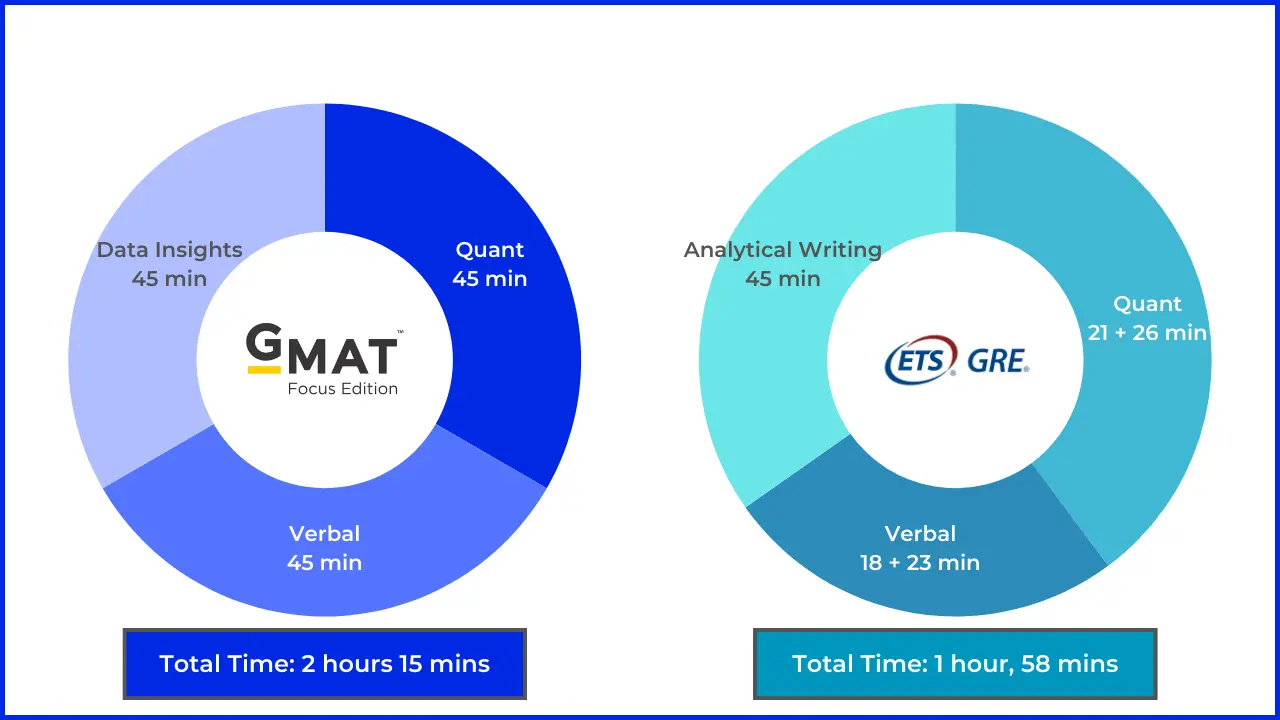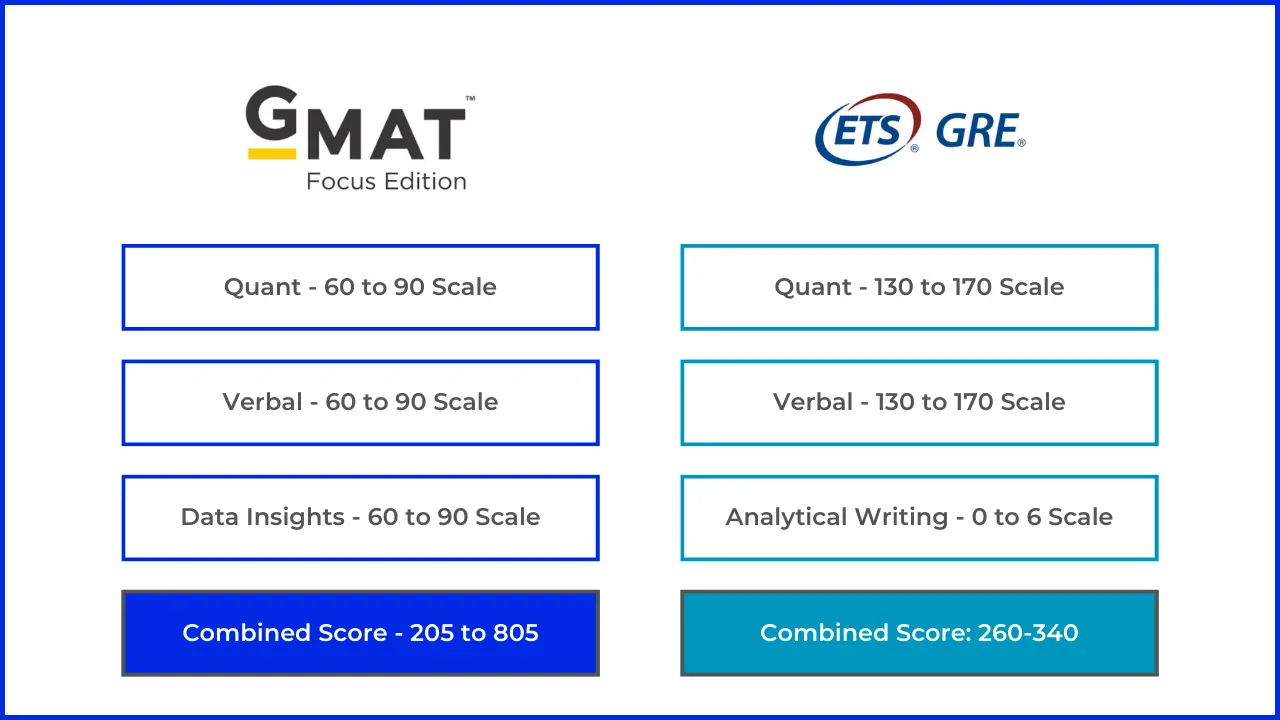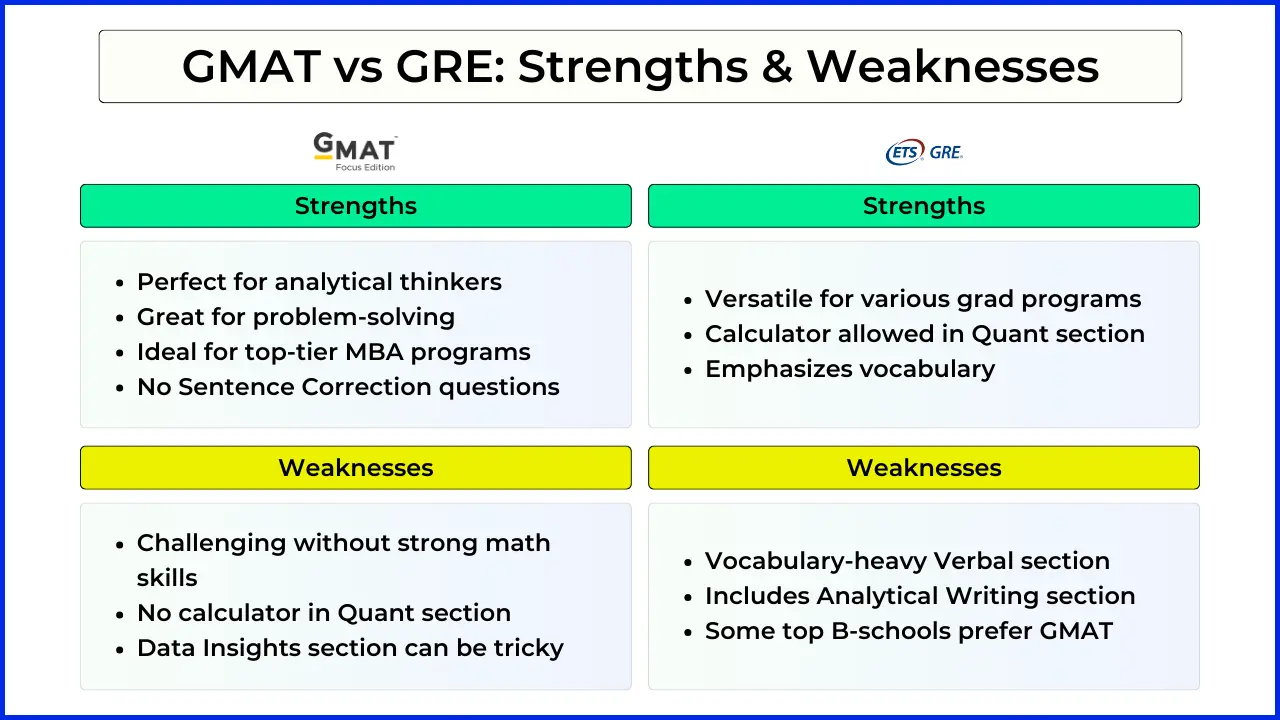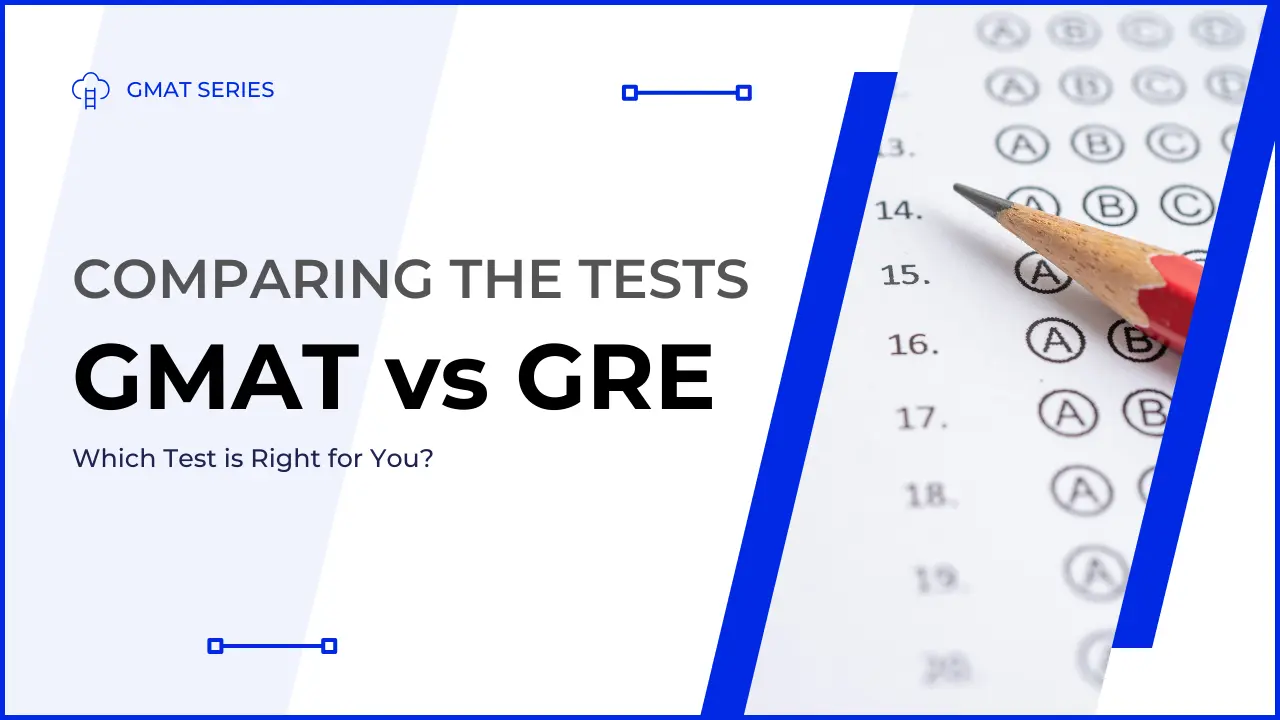Let’s face it…
Choosing between GMAT vs GRE for your MBA application is tough.
But here’s some good news:
By the end of this guide, you’ll know exactly which test is right for you.
Here’s what we’ll cover:
- GMAT vs GRE: Understanding the Tests
- Key Differences: GMAT vs GRE
- GMAT vs GRE: Which is Easier?
- Business School Preferences
- Making Your Choice: GMAT vs GRE
- Preparation Strategies
- GMAT vs GRE: Frequently Asked Questions
Now, let’s dive in.
Let’s break it down:
The GMAT (Graduate Management Admission Test) is like the seasoned pro in the business school world. It’s been the go-to test for MBA hopefuls since forever.
But here’s where it gets interesting…
The GRE (Graduate Record Examination) is the new kid on the block, shaking things up in the MBA admissions game.
Now, you might be thinking…
“Wait, isn’t the GRE for general graduate programs?”
You’re not wrong.
But here’s the kicker…
As of 2024, over 1,200 MBA programs are accepting GRE scores.
That’s a game-changer, folks.
Let’s look at the key players:
GMAT:
- Designed specifically for business school
- Tests your business-ready skills
- Scores range from 205 to 805
GRE:
- More versatile, used for various graduate programs
- Tests general academic abilities
- Scores range from 260 to 340
But here’s the million-dollar question…
Which one should you choose?
That’s exactly what we’re going to cover in this comprehensive guide.
But first, let me share a quick story about our student. Let’s call him Anshul.
When Anshul was applying to business schools, he was dead set on taking the GMAT. It seemed like the “traditional” choice for MBA programs.
But after doing some research (and taking practice tests for both exams), he realized the GRE played more to his strengths.
The lesson?
Don’t make assumptions. Your best choice might surprise you.
By the end of this guide, you’ll know exactly which test is your ticket to MBA success.
Ready to level up your MBA application game? Let’s go.
Now, let’s break down everything you need to know about GMAT vs GRE so that you can make the right decision for your graduate school journey.
Grab your free copy of ‘Demystifying GMAT FE’
Grab your free copy of ‘Demystifying GMAT Focus Edition’
1. GMAT vs GRE: Understanding the Tests
Alright, let’s break down the essentials of the GMAT and GRE.
GMAT: The Business School Heavyweight
The GMAT isn’t just any old test. It’s like the Swiss Army knife of business school admissions.
The GMAT is laser-focused on one thing: assessing your readiness for business school.
It’s not testing how well you can memorize facts. Nope! It’s all about:
- Critical thinking
- Problem-solving
- Data analysis
- Logical reasoning
In other words, the skills you’ll need to crush it in your MBA program.
Let’s explore the test structure and the sections.
Now, here’s where it gets juicy.
The GMAT Focus Edition (launched in 2024) is like the GMAT on steroids. It’s shorter, more focused, and packs a punch.
Check this out:
| Section | Questions | Time |
|---|---|---|
| Quantitative Reasoning | 21 | 45 minutes |
| Verbal Reasoning | 23 | 45 minutes |
| Data Insights | 20 | 45 minutes |
Total time? A cool 2 hours and 15 minutes.
Here’s the cool bit:
The Data Insights section is brand new. It’s like the GMAT’s secret weapon. It tests your ability to analyze and interpret data. Talk about being relevant for today’s data-driven business world!
Now, let’s talk numbers.
The GMAT Focus Edition uses a 205-805 scoring scale, in 10-point increments.
But wait, there’s more:
Each section (Quant, Verbal, Data Insights) is scored separately on a 60-90 scale.
⇒ Continue Reading: Everything You Need to Know about the New GMAT Focus Edition
GRE: The Jack of All Trades
Now, let’s switch gears and talk about the GRE.
Here’s the thing about the GRE:
It’s like having a graduate school admission genie in a bottle.
It’s not just for business school. Law schools, engineering programs, humanities – you name it, the GRE’s got you covered.
And here’s the twist…
The GRE got a makeover in 2023, and it’s looking sleek. Here’s the breakdown:
| Section | Questions | Time |
|---|---|---|
| Analytical Writing | 1 "Analyze an Issue" task | 30 minutes |
| Verbal Reasoning | Section 1: 12 questions Section 2: 15 questions | Section 1: 18 minutes Section 2: 23 minutes |
| Quantitative Reasoning | Section 1: 12 questions Section 2: 15 questions | Section 1: 21 minutes Section 2: 26 minutes |
Total time? A breezy 1 hour and 58 minutes.
The scoring of this test is just as breezy.
- Verbal and Quant: Scored 130-170, in 1-point increments
- Analytical Writing: Scored 0-6, in half-point increments
But here’s the secret sauce:
The GRE uses section-level adaptation. Ace the first section, and the second one gets harder. But don’t sweat it – a harder second section means more points for correct answers.
So, there you have it. The GMAT and GRE, boiled down to the basics.
But here’s the showstopper…
Which one is right for YOU?
Stick around, because we’re about to explore the key differences that could make or break your grad school application.
Grab your free copy of ‘Demystifying GMAT FE’
Grab your free copy of ‘Demystifying GMAT Focus Edition’
2. Key Differences: GMAT vs GRE
Alright, let’s jump into the juicy details of how the GMAT and GRE stack up against each other. Hang on, this is where the fun begins!
A. Test Format and Structure
Here’s the deal:
Both tests have gone through some serious makeovers recently. Let’s simplify this:
GMAT Focus Edition (2024):
- Total time: 2 hours 15 minutes
- Sections: 3 (Quantitative, Verbal, Data Insights)
- Questions: 64 total
GRE (2023 update):
- Total time: 1 hour 58 minutes
- Sections: 5 (1 Analytical Writing, 2 Verbal, 2 Quantitative)
- Questions: 55 total + 1 essay

But this is where the plot thickens!
The GMAT ditched the Analytical Writing section, while the GRE kept it. Talk about a plot twist!
B. Content and Question Types
Now, let’s get into the nitty-gritty:
GMAT:
- Quant: Arithmetic, Algebra, and Modern Math
- Verbal: Critical Reasoning and Reading Comprehension
- Data Insights: Multi-source Reasoning, Two-part Analysis, Table Analysis, Graphics Interpretation, and Data Sufficiency.
GRE:
- Quant: Arithmetic, Algebra, Geometry, and Data Analysis
- Verbal: Reading Comprehension, Text completion, and Sentence Equivalence
- Analytical Writing: “Analyze an Issue” task
Now get this:
The GMAT’s new Data Insights section is the ultimate business toolkit. It challenges you to analyze and interpret data like a pro.
C. Adaptive Testing Methods
Both tests are adaptive, but they do it differently:
- GMAT: Question-level adaptive
- GRE: Section-level adaptive for Verbal and Quant
What does this mean for you?
In the GRE, your performance in one section affects the difficulty of the next section. It’s like a high-stakes video game where each level gets harder (or easier) based on how well you’re doing (or not).
D. Scoring Systems and Score Validity
Check this out:
GMAT Focus Edition:
- Total score: 205-805
- Section scores: 60-90 each
- Validity: 5 years
GRE:
- Verbal and Quant: 130-170 each
- Analytical Writing: 0-6
- Validity: 5 years

Here’s the lowdown:
A 645 on the new GMAT is like getting a 700 on the old GMAT. It’s all about those percentiles!
E. Cost and Logistics
Let’s talk money!
But before that…
Both tests offer options to take the exam online or at a test center and the cost is different for both formats.
GMAT Focus Edition:
- Test center: $275
- Online: $300
GRE:
- Worldwide (except China): $220
- China: $231.30
So, what’s the bottom line?
The GMAT is laser-focused on business skills, while the GRE casts a wider net. Your choice depends on your strengths and where you want to apply.
Remember: It’s not just about the test, it’s about showcasing your awesome skills to your dream schools!
Let us summarize the key differences between the GMAT and GRE in a neat and clean table format:
| Aspect | GMAT | GRE |
|---|---|---|
| Full Name | Graduate Management Admission Test | Graduate Record Examination |
| Primary Use | Business school admissions | Various graduate programs |
| Test Structure | • Verbal Reasoning (45 min, 23 questions) • Quantitative Reasoning (45 min, 21 questions) • Data Insights (45 min, 20 questions) |
• Verbal Reasoning (2 sections, 41 min total, 27 questions) • Quantitative Reasoning (2 sections, 47 min total, 27 questions) • Analytical Writing (30 min, 1 essay) |
| Total Time | 2 hours 15 minutes | 1 hour 58 minutes |
| Scoring System | • Total score: 205-805 (10-point increments) • Section scores: 60-90 each |
• Verbal and Quant: 130-170 each (1-point increments) • Analytical Writing: 0-6 (0.5-point increments) |
| Adaptive Testing | Question-level adaptive | Section-level adaptive |
| Math Difficulty | Generally considered more difficult | Considered easier, allows calculator use |
| Verbal Focus | Critical Reasoning and Reading Comprehension | Vocabulary and Reading Comprehension |
| Unique Sections | Data Insights | Analytical Writing |
| Cost | $300 (online), $275 (test center) | $220 (most locations) |
| Score Validity | 5 years | 5 years |
This table provides a concise overview of the main differences between the GMAT and GRE, helping prospective test-takers make an informed decision based on their strengths and graduate program goals.
Grab your free copy of ‘Demystifying GMAT FE’
Grab your free copy of ‘Demystifying GMAT Focus Edition’
3. GMAT vs GRE: Which is Easier?
Alright, let’s examine the finer points of GMAT vs GRE difficulty. Ready or not, here comes the fun part!
Here’s the inside info:
The “easier” test is like trying to pick the comfiest pair of shoes. What fits one person perfectly might give another person blisters. It all comes down to your unique strengths and weaknesses.
But don’t worry, we’ve got your back. Let’s break this down piece by piece.
A. Comparing Difficulty Levels
GMAT:
- Quant section no longer includes Data Sufficiency (It’s now in Data Insights)
- Verbal section has dropped Sentence Correction entirely
- New Data Insights section tests your ability to analyze complex information
GRE:
- Quant section allows calculator use (unlike GMAT Quant)
- Verbal section is heavy on vocabulary
- The test still includes an Analytical Writing section
B. Strengths and Weaknesses of Each Test
Let’s dissect this:
GMAT Strengths:
- Perfect for number crunchers and analytical thinkers
- Great for those who excel in problem-solving and data interpretation
- Ideal if you’re targeting top-tier MBA programs
- Loved by those who struggle with grammar – no more Sentence Correction questions
GMAT Weaknesses:
- Can be challenging if you’re not a math whiz
- No calculator allowed in the Quant section (but it’s allowed in the Data Insights section)
- New Data Insights section might be tricky for some
GRE Strengths:
- More versatile – accepted by various graduate programs
- Calculator allowed in the Quant section
- You’re expected to have a strong vocabulary
GRE Weaknesses:
- Vocabulary-heavy Verbal section can be a nightmare for some
- Still includes an Analytical Writing section
- Some top business schools might prefer GMAT scores

C. Considerations for Non-Native English Speakers
If English isn’t your first language, listen up:
1. Vocabulary vs Grammar
- GMAT Verbal now focuses more on Critical Reasoning and Reading Comprehension
- GRE Verbal is all about that vocabulary game
So the real deal is that many non-native speakers might find the new GMAT Verbal easier to study for.
Why? Because there’s no more Sentence Correction, which often tripped up non-native speakers with its grammar rules.
2. Reading Comprehension
- Both tests have it, and it’s equally challenging for non-native speakers. No easy way out here, folks!
3. Writing Sections
- GMAT Focus Edition: No Analytical Writing Assessment. Hallelujah!
- GRE: Still includes a 30-minute Analytical Writing section. Ouch.
4. Quant vs Verbal Performance
- Non-native speakers often rock the Quant sections in both tests but struggle with Verbal. Keep this in mind when choosing your battle.
5. The New Kids on the Block
- GMAT Focus Edition’s Data Insights section tests your ability to analyze complex data. This could be a game-changer for non-native speakers who excel in data interpretation.
- GRE’s format: Might be more familiar to those who’ve taken standardized tests before.
So, what’s the heart of the matter?
There’s no one-size-fits-all answer. But here’s what you can do:
- Take practice tests for both GMAT and GRE
- Analyze your performance in each section
- Consider your target schools’ preferences
- Think about your long-term career goals
Remember: The “easier” test is the one that plays to your strengths and aligns with your goals.
Now, it’s your turn. Which test do you think suits you better?
GMAT Focus Edition or GRE?
Let me know in the comments!
Grab your free copy of ‘Demystifying GMAT FE’
Grab your free copy of ‘Demystifying GMAT Focus Edition’
4. Business School Preferences
You know what’s crazy?
The landscape of B-school admissions is shifting faster than you can say “MBA”.
Let’s get into the details:
A. Acceptance rates of GMAT vs GRE
The story goes like this:
The GMAT has been losing ground to the GRE, and the numbers don’t lie.
Check this out:
| Year | Average GMAT Submissions (Top 25 Schools) | Average GRE Submissions (Top 25 Schools) |
|---|---|---|
| 2022 | 54.2% | 29.6% |
| 2023 | 46.5% | 30.6% |
That’s right, folks.
The GMAT dropped by a whopping 7.7 percentage points, while the GRE crept up by 1%.
It gets better!
- In 2023, 16 out of 53 top-ranked business schools (over 30%) received more GRE submissions than GMAT submissions.
- In 2022, only 8 schools (17.4%) had more GRE than GMAT submissions.
Talk about a plot twist!
B. Top MBA programs’ stance on GMAT vs GRE
Now, let’s look at how the cream of the crop is handling this GMAT vs GRE showdown:
Harvard Business School:
- GMAT submissions: 69% (down from 74% in 2022)
- GRE submissions: Data not available, but trend suggests an increase
Stanford GSB:
- GMAT submissions: 61% (down from 67% in 2022)
- GRE submissions: 39% (up from 33% in 2022)
Wharton:
- GMAT submissions: 67% (down from 71% in 2022)
- GRE submissions: 37% (up from 30% in 2022)
See the pattern?
Even the big dogs are seeing a shift towards the GRE.
But here’s another mind-boggling statistic:
UC-Berkeley Haas School of Business is leading the GRE charge with a whopping 53% GRE submission rate in 2023. That’s up from 45% in 2022!
C. Industry-specific preferences
Here’s the highlight…
Most B-schools may claim they don’t prefer one test over the other. But the industry you’re coming from (or heading to) might influence your choice.
Here’s the scoop:
Consulting and Finance:
- These industries still have a slight preference for the GMAT.
- Why? The GMAT’s focus on data interpretation and critical reasoning aligns well with these fields.
Tech and Entrepreneurship:
- The GRE is gaining traction here.
- The test’s broader focus and inclusion of an Analytical Writing section can be a plus for creative problem-solvers.
Non-profit and Social Impact:
- The GRE is often preferred in these sectors.
- Its versatility aligns well with the diverse skill set needed in these fields.
But guess what?
These preferences are not set in stone. They’re more like gentle nudges than hard rules.
So, what’s the key takeaway?
- The GRE is on the rise, big time.
- Top schools are increasingly GRE-friendly.
- Your industry might have a slight preference toward either test, but it’s not a deal-breaker.
Remember…
At the end of the day, it’s not just about which test you take.
It’s about how well you perform and how that fits into your overall application package.
Now, it’s your turn.
Are you team GMAT or team GRE? Let me know in the comments!
Grab your free copy of ‘Demystifying GMAT FE’
Grab your free copy of ‘Demystifying GMAT Focus Edition’
5. Making Your Choice: GMAT vs GRE
The choice between GMAT and GRE can make or break your B-school application. But don’t sweat it – we’ve got your back.
A. Factors to consider
1. Target schools and programs
Let’s spell it out for you:
- Some schools still have a soft spot for the GMAT. For example, Harvard Business School had 69% GMAT submissions in 2023.
- But get this: UC-Berkeley Haas is leading the GRE charge with a whopping 53% GRE submission rate!
Pro tip: Check your target schools’ class profiles. They’re like a cheat sheet for test preferences.
2. Personal strengths and weaknesses
GMAT strengths:
- Data interpretation
- Critical reasoning
- No more sentence correction (Hurray!!)
GRE strengths:
- Vocabulary
- Essay writing
- Calculator allowed in Quant (math-phobes, rejoice!)
3. Career goals
- GMAT: Still the darling of traditional business careers (consulting, finance)
- GRE: Gaining traction in tech and entrepreneurship
But relax: These preferences are more like gentle nudges than hard rules.
B. Decision-making strategies
Ready for some actionable advice? Here we go:
1. Take practice tests for both exams
2. Analyze your scores
Use this nifty table to compare:
| Section | GMAT Focus Edition | GRE |
|---|---|---|
| Total Score | 205-805 (in 10-point increments) | 260-340 (sum of Verbal and Quant) |
| Verbal | 60-90 | 130-170 (in 1-point increments) |
| Quant | 60-90 | 130-170 (in 1-point increments) |
| Data Insights / Analytical Writing | 60-90 | 0-6 (in 0.5-point increments) |
By the way…
- The total score in the GMAT Focus Edition is not an average or sum of the section scores. It’s calculated using a proprietary algorithm.
- In the GRE, the total score is simply the sum of the Verbal and Quant scores. The Analytical Writing score is reported separately.
3. Consider test structure
- GMAT: 3 sections, 2 hours 15 minutes
- GRE: 5 sections, 1 hour 58 minutes
4. Evaluate prep time
- GMAT: Typically requires more prep time
- GRE: Might be quicker if you’re a vocab whiz
5. Check application deadlines
- GMAT scores are available immediately
- GRE scores take 10-15 days
C. Taking practice tests for both exams
Now, this is crucial. Here’s why:
1. Realistic experience
- Simulates actual test conditions
- Helps manage test anxiety
2. Identify strengths and weaknesses
- Pinpoints areas for improvement
- Helps you tailor your study plan
3. Compare performance
- See which test suits you better
- Make an informed decision
Pro tip: Take at least one full-length practice test for each exam. It’s like test-driving a car before you buy it!
Grab your free copy of ‘Demystifying GMAT FE’
Grab your free copy of ‘Demystifying GMAT Focus Edition’
6. Preparation Strategies
A. Study Resources for GMAT and GRE
The key thing is:
Not all study materials are created equal. Let’s focus on the cream of the crop – official resources and some killer free options:
GMAT Focus Edition Resources:
1. Official GMAT Focus Edition Guide 2024-2025
- Straight from the horse’s mouth (GMAC)
- Includes real exam questions
- Available as eBook & Online Question Bank
2. Free GMAT Focus Edition Mock Test
- Simulates the real deal
- Great for baseline score assessment
3. GMAT Official Practice Exams 3-6
- Access all 6 full-length practice exams
- Adjust to your progress
- Help manage pacing
GRE Resources:
1. ETS Official GRE Super Power Pack
- Includes 3 official guides
- Over 600 real GRE questions
- 2 full-length practice tests
- Simulates the actual GRE experience
- Comprehensive review of math concepts
- Perfect for brushing up on rusty skills
Free Community Resources:
1. GMAT Club
- Massive question bank
- Expert explanations
- Active community forums
- Similar to GMAT Club, but for GRE
- Practice tests and question discussions
- Free GMAT and GRE resources
- Strategy videos and articles
Pro Tip: Mix official guides with free community resources for a well-rounded prep strategy.
B. Time Management Tips
Now, this is where things heat up!
1. Create a study schedule
- Aim for 2-3 hours daily
- Include rest days to avoid burnout
2. Use the Pomodoro Technique
- 25 minutes of focused study
- 5-minute break
- Repeat 4 times, then take a longer break
3. Track your progress
- Use a study log or app
- Celebrate small wins
Here’s a sample weekly schedule:
| Day | GMAT Focus Edition | GRE |
|---|---|---|
| Mon | Quant (1hr), Verbal (1hr) | Verbal (2hrs) |
| Tue | Data Insights (2hrs) | Quant (2hrs) |
| Wed | Practice Test | Practice Test |
| Thu | Review Test Results | Review Test Results |
| Fri | Weak Areas (2hrs) | Weak Areas (2hrs) |
| Sat | Full Mock Test | Full Mock Test |
| Sun | Rest/Light Review | Rest/Light Review |
C. Test-Taking Strategies for Each Exam
GMAT Focus Edition Strategies:
1. Master Data Insights
- New section alert!
- Practice data sufficiency questions
- Focus on multi-source reasoning
2. Verbal Reasoning
- No more sentence correction
- Double down on critical reasoning
3. Quantitative Reasoning
- Time management is key
- Practice mental math
GRE Strategies:
1. Vocabulary is King
- Use official ETS vocabulary lists
- Practice with context-based questions
2. Essay Writing
- Study ETS scoring guides
- Practice with official prompts
3. Quant Section
- Review ETS Math Review thoroughly
- Learn when to use the on-screen calculator
Both tests require adaptive strategies. As you answer questions correctly, they get harder. So, pace yourself and don’t panic if you hit a tough question – it might mean you’re doing well!
Remember: Preparation is key, but so is test-day strategy. Here are some universal tips:
- Get a good night’s sleep before the exam
- Eat a balanced breakfast
- Arrive early to the test center (or set up your home testing area in advance)
- Take deep breaths to manage anxiety
Now, over to you.
What’s your go-to study strategy? Are you a practice test pro or a community forum enthusiast?
Drop a comment and let’s discuss!
Speak To Our Expert GMAT Advisors.
Speak To Our Expert GMAT Advisors
7. Conclusion
A. Recap of key points
Let’s do a quick highlight reel of what we’ve covered:
1. The New Kids on the Block
- GMAT Focus Edition: Launched in 2024, shorter and sweeter
- GRE: Trimmed down in 2023, still versatile
2. Structure Showdown
| Feature | GMAT Focus Edition | GRE |
|---|---|---|
| Total Time | 2h 15m | 1h 58m |
| Sections | 3 (Quant, Verbal, Data Insights) | 5 (1 AWA, 2 Verbal, 2 Quant) |
| Questions | 64 | 54 + 1 essay |
| Adaptive | Question-level | Section-level |
3. Scoring Scoop
- GMAT: 205-805 (total), 60-90 (per section)
- GRE: 260-340 (total), 130-170 (Verbal/Quant), 0-6 (AWA)
4. Content Curveballs
- GMAT: No more Sentence Correction, hello Data Insights!
- GRE: Still rocking that vocabulary game
5. B-School Buzz
- GRE gaining ground (over 1,200 MBA programs now accept it)
- Some top schools seeing 50%+ GRE submissions
6. Industry Insights
- Consulting & Finance: Still GMAT-leaning
- Tech & Entrepreneurship: More GRE-friendly
B. Final thoughts to make your choice: GMAT vs GRE
There’s no one-size-fits-all answer. But here are some final nuggets of wisdom to help you make the call:
1. Play to Your Strengths
- Math whiz? GMAT might be your jam
- Vocabulary virtuoso? GRE could be your ticket
2. Check Your Target Schools
- Some still have a soft spot for GMAT
- Others are all about that GRE life
3. Consider Your Career Path
- Traditional business route? GMAT’s got your back
- Keeping options open? GRE’s versatility shines
4. Test Drive Both
- Take free practice tests for GMAT and GRE
- See which one feels like a better fit
5. Think Long-Term
- GMAT: Laser-focused on business skills
- GRE: Broader applicability for various grad programs
Remember: The best test for you is the one that showcases your strengths and aligns with your goals.
Here’s your action plan:
- Research your target schools’ preferences
- Take practice tests for both GMAT and GRE
- Analyze your performance and comfort level
- Consider your long-term career goals
- Make your decision and commit to crushing it!
At the end of the day, it’s not just about GMAT vs GRE. It’s about presenting the best version of yourself to your dream schools.
So, whether you’re Team GMAT Focus or Team GRE, remember this:
Your test score is just one piece of the puzzle. Your experiences, achievements, and unique perspective are what will truly set you apart.
Now, go out there and show those B-schools what you’re made of!
Over to you: Which test are you leaning towards? Drop a comment and let’s keep this conversation going!


![GMAT Focus Edition: The Ultimate Guide [Updated 2024] – Sample](https://www.crackverbal.com/wp-content/uploads/2024/04/GMAT-FE-top-400x250.webp)

0 Comments